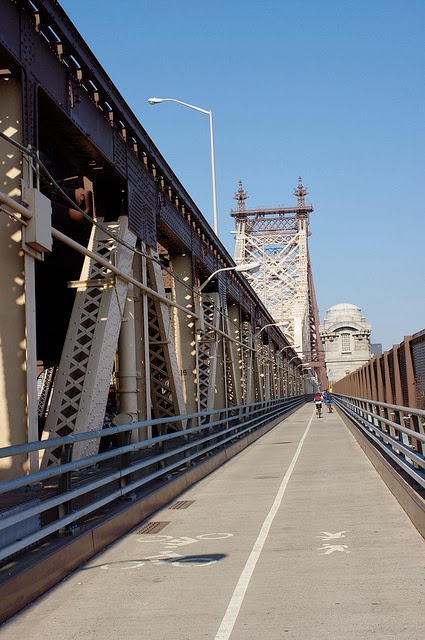New York
City is an island, this is an understatement. The city is composed of 5
boroughs which include Manhattan Island, surround by busy, over populated
neighborhoods in which most of the workforce reside. These individuals create
the highest demand on transportation in the nation. Their options are: boat
ferries, underground tunnels, sky trams, walking, biking and taking a motorized
vehicle (taxi, private, bus, etc). Out of these, more than half are possible
due to the bridges that connect this global city to the rest of the world.
 | ||
| Willaimsburg Bridge Peds and Bike Tracks Join |
Besides the tolled motorized methods, which are a nightmare at rush hour,
walking bridges is tedious, and doesn’t prove to be the most pleasant
promenade. Most, if not every bridge connecting the Boroughs and New Jersey to Manhattan
have dedicated bike lanes which include traffic control devices and are separated
from motorized vehicles. All bridges differ in lane design, which is a bit upsetting
once you are used to a daily commute and are forced to explore other alternatives.
 |
| Brooklyn Bridge Narrow Bike and Ped Path |
As an avid bicyclist, I’ve had the opportunity to travel on most of these bridges;
including the Brooklyn, Manhattan, Williamsburg, Queensboro and George Washington,
and other Bronx bridges.
Each
experience has been unique in from safety, flow, traffic devices, lane width, end
intersections and ramps. My daily commute consists of the Williamsburg Bridge onto
East Broadway to the financial district. The bridge is composed of four separate mode
paths: motor vehicles, pedestrians, trains, and bicycles. While the train
tracks remain in the centerline of the bridge, with the motorized lanes on its
exterior, the pedestrian and bicycle paths are set above these.
This is an excellent
design due to that the noise level from the motor and tracks are somewhat
buffed to the exposed individuals above. In addition the pedestrian track is on
the southside of the bridge, totally separated from the bike tracks which
differ from the Brooklyn bridge lanes where several accidents have occurred due
to its narrow lanes. This The conditions of the lanes are good and have visible
markings and warnings, the occasional chipping of the thin layer of asphalt
that bikes require are treated annually. The width of the lanes is adequate for
faster bikes to pass slower ones without creating any dangers for oncoming
traffic. The slope of this bridge is not too dramatic as the ends were
developed well inland on the Manhattan and Brooklyn sides, so this isn’t too
much of a burden on cyclists. This differs from the Manhattan and Queensboro
bridges which is drastically different in the ascending and descending slopes.
 |
| Queensboro Bridge Bike and peds lanes |
 |
| Brookyln Bridge Ped and Bike paths |
Finally, the
intersections and access ramps towards and from the bridge dedicated lanes on
the Williamsburg Bridge were clearly considered in the overall design. On the Manhattan
side, the main intersection has various traffic signals and barriers informing
motorized drivers of busy bicycle crossings while the green light time for bike
and ped bridge access is decent and comfortable. On the Brooklyn side, the
pedestrian and bicyclist tracks arrive at separate side of the bridges width
and have quick access to the loop around under the bridge immediately after the
exits. Compared to the other bridges, the Queensboro bridge lanes prove difficult
to find as one must go around the block and towards the middle of the bridge
foundation, one can finally access them. The Manhattan intersection for this
bridge has been established the most dangerous intersections in the city where bicyclists
have gotten hit. On the Brooklyn Bridge, the slope proves to be comfortable to
such a point where the distance to the midpoint is twice as long, and finally
the Manhattan Bridge does have safer access points, but like the 59h bridge,
they are not symmetrical to the structures center line.
 |
| Williamsburg Bridge: Manhattan access |


No comments:
Post a Comment